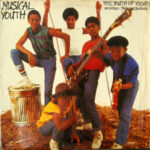XTC, the British band formed in the mid-1970s, stands as a testament to the power of artistic evolution. Over their lengthy and influential career, XTC continually pushed the boundaries of music, transcending genres and defying expectations. This comprehensive biography takes a detailed look at the band’s journey, from their early days to their lasting impact on the world of alternative rock.
Formation and Early Days
XTC was formed in Swindon, England, in 1972, initially under the name “The Helium Kidz.” The core members were Andy Partridge (vocals, guitar), Colin Moulding (bass, vocals), Terry Chambers (drums), and Barry Andrews (keyboards). Andrews was later replaced by Dave Gregory. The band’s early sound was rooted in punk and new wave, capturing the energy and rebellion of the era.
Debut Album: “White Music” (1978)
XTC’s debut album, “White Music,” released in 1978, was a burst of frenetic, punk-inspired energy. Songs like “Radios in Motion” and “This Is Pop” signaled the band’s arrival and introduced their distinctive blend of pop melodies with angular and edgy instrumentals.
The Shift with “Go 2” (1978)
With their second album, “Go 2,” released later in 1978, XTC began to explore a more experimental sound. The band’s music featured dissonant harmonies, unusual time signatures, and intricate guitar work. Songs like “Meccanik Dancing (Oh We Go!)” and “Battery Brides (Andy Paints Brian)” showcased this evolution.
The Landmark “Drums and Wires” (1979)
In 1979, XTC released “Drums and Wires,” a pivotal album that showcased the band’s shift towards a more accessible and melodic sound. The album featured the hit single “Making Plans for Nigel,” which became one of the band’s most iconic songs. “Drums and Wires” also introduced Dave Gregory, whose guitar work became an integral part of XTC’s evolving sound.
“Black Sea” (1980): A Further Maturation
“Black Sea,” released in 1980, marked another step in XTC’s maturation. The album featured the hit single “Generals and Majors” and highlighted the band’s ability to craft catchy, radio-friendly songs while maintaining their unique artistic identity.
The Dukes of Stratosphear: A Psychedelic Departure
In the mid-1980s, XTC adopted the alter ego “The Dukes of Stratosphear” and released two albums under this moniker. The Dukes allowed the band to explore psychedelic and ’60s-inspired sounds. “25 O’Clock” (1985) and “Psonic Psunspot” (1987) offered a stark departure from their earlier work.
“Skylarking” (1986) and the Todd Rundgren Collaboration
“Skylarking,” produced by Todd Rundgren and released in 1986, was a critical success and is often considered one of XTC’s finest albums. The collaboration with Rundgren pushed the band to new heights, and the album featured standout tracks like “Dear God” and “Earn Enough for Us.”
The Challenging “Oranges & Lemons” (1989)
“Oranges & Lemons,” released in 1989, presented its own set of challenges. The album was ambitious and featured a diverse array of styles and influences. Songs like “Mayor of Simpleton” received radio play, but the album’s complexity made it a more polarizing release.
Retirement from Live Performances
After a difficult tour to support “Oranges & Lemons,” Andy Partridge’s ongoing stage fright led to the band’s decision to retire from live performances. XTC transitioned to a studio-only band, which allowed them to focus on their musical creativity without the pressures of touring.
“Nonsuch” (1992) and “Apple Venus Volume 1” (1999)
In 1992, XTC released “Nonsuch,” an album that saw them revisit the more melodic and accessible sound of “Skylarking.” In the late 1990s, after a long hiatus, XTC released “Apple Venus Volume 1” (1999), which further solidified their reputation as innovative songwriters and musicians.
Legacy and Influence
XTC’s legacy is immeasurable. Their music, which traversed genres and pushed musical boundaries, has inspired countless bands and artists. Their journey from punk and new wave roots to complex and experimental sounds showcases their artistic evolution. Hits like “Senses Working Overtime,” “Dear God,” and “Making Plans for Nigel” remain beloved classics.
Conclusion: XTC’s Enduring Artistry
XTC’s enduring artistry and commitment to pushing musical boundaries have cemented their status as legends of alternative rock. From their humble punk beginnings to their complex and genre-defying later work, XTC’s evolution reflects the ever-changing landscape of the music industry. Their unique sound, marked by intricate songwriting, clever wordplay, and a willingness to experiment, has left an indelible mark on the world of alternative rock and beyond.
Influence on Later Generations
XTC’s music has continued to influence generations of musicians and artists. Bands like Blur, The Dukes of Stratosphear, and They Might Be Giants have cited XTC as a major inspiration. The band’s ability to seamlessly blend pop sensibilities with avant-garde elements created a template for future artists to explore and innovate within the realm of alternative and indie rock.
Andy Partridge’s Songwriting Prowess
Andy Partridge, the primary songwriter of XTC, is widely recognized for his intricate and poetic lyrics. His ability to craft thought-provoking and often whimsical songs has earned him a devoted following. Partridge’s lyrics have been praised for their wordplay and imaginative storytelling, further solidifying XTC’s reputation as a band that appealed to both the heart and the intellect.
A Legacy of Innovation
XTC’s willingness to push the envelope and explore new musical territory is a testament to their dedication to artistic innovation. Their use of unconventional time signatures, intricate arrangements, and a wide range of instruments showcased a commitment to creativity that transcended commercial pressures. This approach set them apart as true artists, unafraid to challenge the norms of the music industry.
Post-XTC Careers
After XTC’s last album, “Wasp Star (Apple Venus Volume 2)” was released in 2000, the band went on an indefinite hiatus. Since then, members have pursued their individual musical interests. Andy Partridge continued to write and record music, often collaborating with other artists. Colin Moulding, on the other hand, largely stepped away from the music scene but has made occasional guest appearances.
Rediscovery and Appreciation
In recent years, there has been a resurgence of interest in XTC’s music, with younger generations discovering their innovative sound. Reissues of their albums and renewed critical acclaim have brought XTC back into the public eye. Their influence on contemporary indie and alternative rock is unmistakable, and their music remains as fresh and relevant today as it did during their heyday.
Conclusion: XTC’s Enduring Relevance
XTC’s journey through the music industry reflects a commitment to artistic innovation and a refusal to be confined by genre or convention. From their humble beginnings in the punk and new wave scenes to their later explorations of psychedelic and melodic sounds, XTC carved out a unique space in the world of alternative rock. Their timeless songs, poetic lyrics, and complex arrangements continue to captivate new audiences while maintaining their appeal to long-time fans. XTC’s enduring legacy as innovators and pioneers in the music industry is a testament to the enduring power of creativity and the unyielding spirit of artistic evolution.
This post has already been read 258 times!










